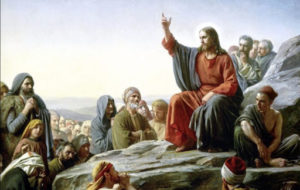Eccles 15:15-20. Ps 118. 1 Cor 2:6-10. Mt 5:17-37.
 Any new movement or community which emerges from an older tradition has to face the problem of its own identity and direction. How different is it from the old community? How similar? One of the problems the early Christians had to face was its relationship with Judaism. Jesus and his followers were bound by the law of Judaism but there is a discontinuity with that law when it comes to healing on the Sabbath, attitude to Samaritans and fasting. Christ invites us in today's liturgy to choose love as the fulfilling of the law.
Any new movement or community which emerges from an older tradition has to face the problem of its own identity and direction. How different is it from the old community? How similar? One of the problems the early Christians had to face was its relationship with Judaism. Jesus and his followers were bound by the law of Judaism but there is a discontinuity with that law when it comes to healing on the Sabbath, attitude to Samaritans and fasting. Christ invites us in today's liturgy to choose love as the fulfilling of the law.
Matthew wrote in AD80 when the Christian community is facing heavy criticism from the official Jewish leadership: they claim that the teaching of Jesus is destructive of all that is cherished in Judaism. Around AD85, one of the prayers read in the synagogues is a formal curse on everyone, especially Jewish Christians who believe that Jesus is the messiah. Jewish Christians were now expelled from the synagogues, and this expulsion instigated by the Pharisees, increased the hostility of Christians towards them. So, when Matthew writes his Gospel, he was anxious to show that Jesus does not come to abolish the law and the prophets, rather he is their completion. Matthew shows continuity with the ancient tradition but he also shows some discontinuity especially where Jesus says: you have heard how it was said...but I say this to you...
Jesus completes the law but he also goes beyond it.
Jesus invites us to work hard so that our virtue goes beyond that of the Pharisees. He says unless we do that, we shall not inherit the kingdom of God. This statement must have angered his hearers, especially those who thought themselves as virtuous. Virtue is shallow hen it lacks personal conviction and is practised merely out of convention or conformity or routine. Virtue is inauthentic when it is not sincere. But there is a genuine virtue. There is deep, authentic, true virtue. It is not a skin deep-thing, but an expression of what one is inside. Above all, it is a revelation of the heart. Sin and virtue, badness and goodness are essentially matters of the heart. And it is from the perspective of the heart that a Christian should assess them.
For all their piety, the Pharisees were both cold-hearted and hard-hearted. If one's heart is cold and hard, how can that person be virtuous?
On the other hand, one of the things we can say about someone is that he is warm-hearted or soft-hearted. This means he is capable of goodness, kindness, tenderness, pity, compassion, mercy... One cannot be a truly religious or virtuous person without being soft-hearted and warm-hearted, possessing good virtue. The sate of the heart determines how we live. We must strive or the goodness of the heart.
Our good deeds will then flow from what we are, as naturally as good fruit from a good tree. You can't go any deeper than that.
When we see our record of doing good against the demands of Jesus in the Gospel, we can all come away feeling helpless. Our efforts look so shabby against the clear unambiguous demands of the larger vision. Matthew is not wiring his gospel to grind his readers into the dirt or make them feel helpless. He is calling us to face the vision of Jesus with a willing heart and a ready spirit. None of us can do this alone. That is precisely why we are gathered here as a community to pray that God will fund our efforts to bring that vision down to earth.




Be the first to comment